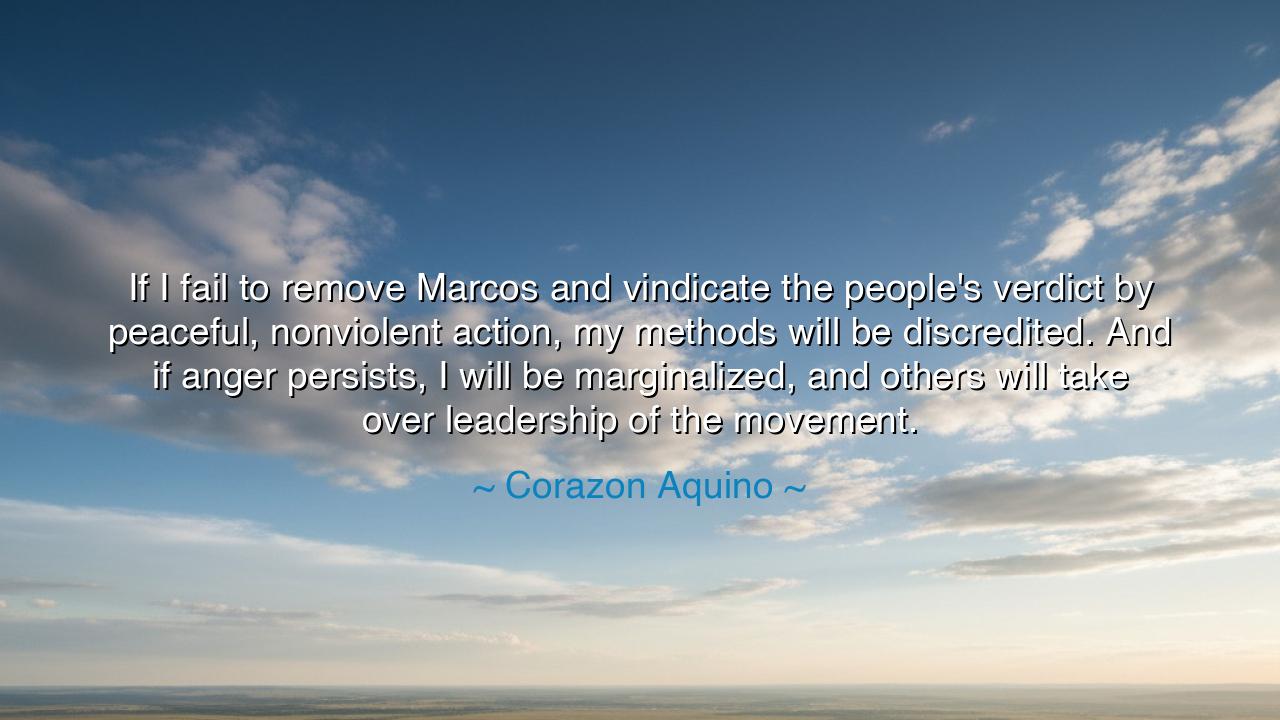
If I fail to remove Marcos and vindicate the people's verdict by
If I fail to remove Marcos and vindicate the people's verdict by peaceful, nonviolent action, my methods will be discredited. And if anger persists, I will be marginalized, and others will take over leadership of the movement.






Host: The room was quiet, the soft hum of the world outside barely reaching the space. Jack sat near the window, staring out at the fading light, his thoughts lost in the weight of Corazon Aquino’s words. Jeeny, across from him, sat in a chair with her legs tucked beneath her, her cup of tea resting in her hands, her attention clearly focused inward. The atmosphere between them felt still, as though something significant was about to unfold.
Host: Corazon Aquino’s words filled the room: “If I fail to remove Marcos and vindicate the people's verdict by peaceful, nonviolent action, my methods will be discredited. And if anger persists, I will be marginalized, and others will take over leadership of the movement.” The seriousness of the statement, and the acknowledgment of the power of nonviolent action, felt both sobering and empowering. Jack, always reflective about leadership and the weight of political responsibility, was the first to speak.
Jack: His voice was thoughtful, a hint of reverence in it: “I get that. Aquino was caught between a rock and a hard place. She had to lead the movement, but she couldn’t let anger take over. The power of nonviolence—especially in the face of a dictatorship—is incredibly strong, but it also requires restraint. If you let anger drive the movement, you lose the moral high ground, and the movement itself loses its credibility. The method must be as strong as the cause.”
Jeeny: She nodded, her voice calm, but with a quiet intensity: “Exactly. The power of nonviolence isn’t just about avoiding physical confrontation—it’s about holding onto the principles of justice and truth, even in the face of immense pressure. Aquino knew that any sign of anger or violence would derail the movement and allow the opposition to label her as just another angry leader. She had to maintain the moral clarity to keep the people united and focused on peaceful change.”
Host: The conversation deepened, the weight of Aquino’s responsibility in leading a revolution through peaceful means seeming more complex with each word. Jack’s usual focus on the practical side of leadership seemed to soften as he considered the emotional weight of guiding a people’s movement—especially when that movement demanded both moral strength and a clear vision.
Jack: His voice softened, almost reflective, as he continued: “I think what’s so powerful about Aquino’s approach is that it wasn’t about just winning. It was about maintaining the integrity of the movement—keeping it focused on peace and justice. There was an awareness that if she allowed anger to take over, the movement would lose its essence, its legitimacy. It’s a reminder that in the pursuit of justice, we can’t let our emotions undermine our message.”
Jeeny: Her expression softened, her voice reassuring, but with quiet strength: “Exactly. There’s a fine line between righteous anger and the kind of anger that becomes destructive. Aquino understood that, even when the stakes were incredibly high. She knew that leadership required not just political strategies, but the ability to stay grounded in her principles and calm in the face of pressure. That’s what would inspire people and give them the strength to keep fighting.”
Host: The room seemed to grow a little heavier, as though the weight of Aquino’s words had unlocked something deeper about the nature of leadership and the power of restraint. The idea that true leadership doesn’t come just from power or action, but from maintaining a moral and peaceful path, even when the world around you is falling apart, felt like a significant insight. Jack and Jeeny sat together, understanding that leadership wasn’t just about moving forward—it was about guiding people with purpose and integrity, ensuring that the path toward change remained intact.
Jack: His voice was now gentler, almost resolved: “I think what Aquino was really pointing out is that leadership has to be more than just action—it has to be about vision, about maintaining the right course even when things get tough. Her method of peaceful, nonviolent action wasn’t just a strategy, it was a statement of principle. It was about ensuring that, no matter what, the movement stayed true to its values.”
Jeeny: She nodded, her smile deepening with understanding: “Exactly. It’s not enough to just be right—you have to lead with integrity, with the courage to stay true to your cause, no matter how hard it gets. Aquino’s leadership wasn’t just about removing Marcos; it was about ensuring the process was just, and that the people stayed unified in their commitment to peace.”
Host: The evening continued, but the conversation had left them with a deeper understanding of the complexity of leadership, especially in times of revolution and struggle. The world outside remained quiet, but inside, Jack and Jeeny sat with the realization that leadership isn’t just about action or results—it’s about staying grounded in principles and maintaining the moral clarity needed to inspire true change. Aquino’s words were a reminder that in the pursuit of justice, we must not let anger or fear define the path we take.






AAdministratorAdministrator
Welcome, honored guests. Please leave a comment, we will respond soon